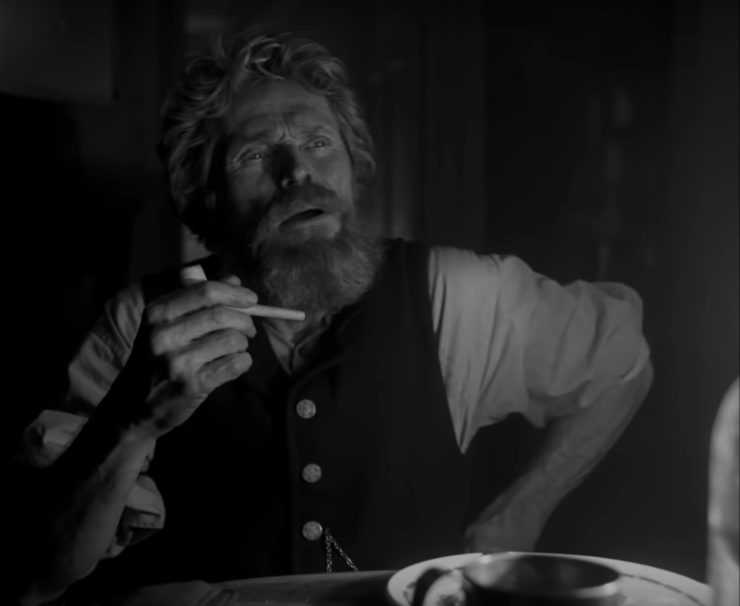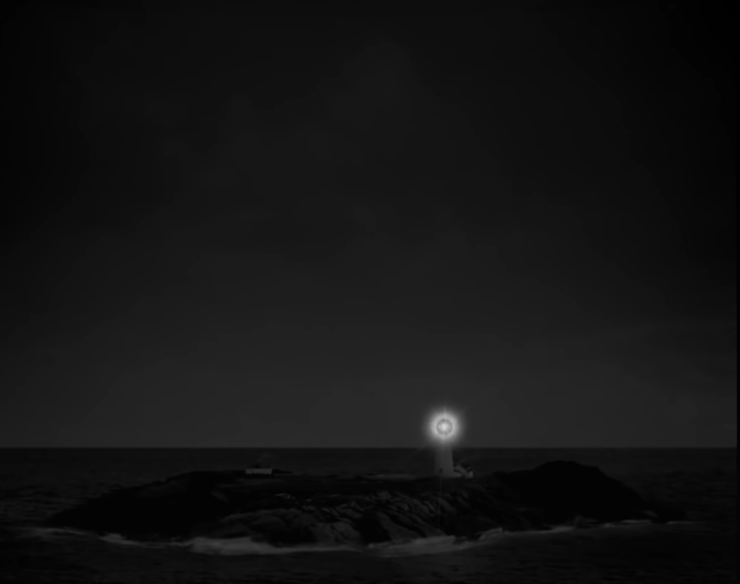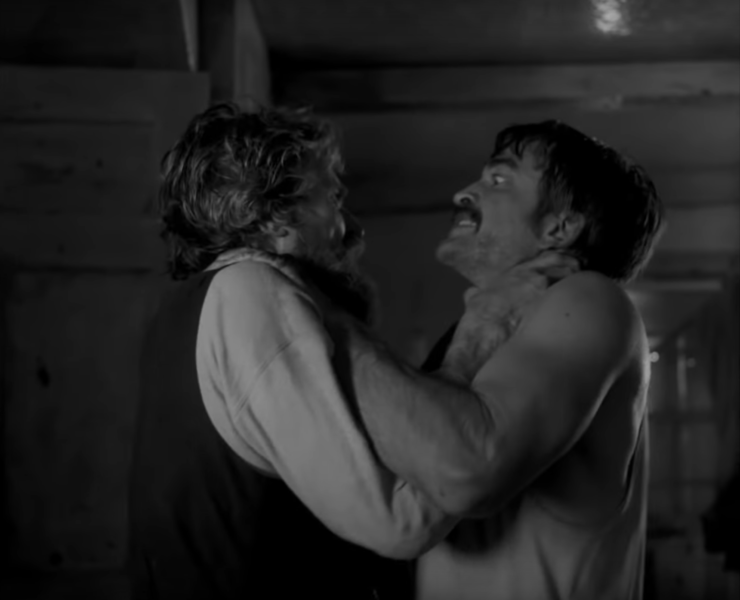Robert Eggers’ The Lighthouse is not an easy movie to write about. Compared to The Witch, which was a much more straight-ahead horror film, The Lighthouse is even more atmospheric, and moves at an even slower pace. It’s not exactly spoil-able, as very little happens in the film, and yet I don’t want to say too much as this is more of an experience than a movie, and the more you know the more the experience might be tainted.
I will say that Eggers has once again given us a film that looks at how humanity tries to impose order on Nature, and how Nature tends to buck that imposition right the hell off. In this case he’s pitting two men against The Sea, rather than one family against The Wilderness, but he has created a gripping, utterly singular cinematic experience. Just with fewer goats this time.
In a review last week I questioned whether Gemini Man counted as a movie, since it was more like an elaborate Oculus cut scene than a truly immersive work of cinema. The Lighthouse is possibly Gemini Man’s inverse: an extraordinarily powerful work of film that relies on mood and atmosphere to create an experience, rather than presenting a linear plot to be watched by a passive audience. As in The Witch, Eggers achieves this by wrapping the viewer in a cocoon of ambient music and nature sounds, and setting his terms as bleakly as he did in his previous film. Where William and Katherine’s family were essentially trapped on a tiny farm outpost, surrounded by stark wilderness and a possibly haunted forest, Tom Wale and Ephraim Winslow are the only two men on a barren rock, tending a lighthouse that absolutely must remain lit, no matter how terrible the weather or how physically exhausted they are. The waves pound, the wind screams, the gulls are relentless, the rain goes on for days.
But what’s worse is when the two men seek shelter in the house together, because then they have to reckon with the fact of the other man.
Again, this film defies the banalities of plot synopsis, but I’ll give it a try. Tom Wale is the head lighthouse keeper, or “wickie,” on a very isolated clump of rock off the coast of the Northeastern United States. The film was made in Nova Scotia, but since Eggers makes a point of zooming in all the U.S government-stamped paraphernalia, he clearly wants us to know we’re in New England—Moby Dick country, one might say. (One also might say that the lighthouse itself is one big white moby, er, phallus, and yes, Eggers wants you to meditate upon that fact.) Ephraim Winslow is the assistant wickie, which means that he has to do all the hard work while Wale yells at him. Wale also steadfastly refuses to allow Ephraim access to the light, bellowing “She’s mine!” whenever the other man brings it up. This begins to bother Ephraim. Things become rather tense. Ephraim shovels coal for the light, repaints the lighthouse, cleans the house, empties the chamber pots, and cleans the cistern… or he tries to, but as the cistern never seems to give them potable water, he finally starts drinking Wale’s liquor. That’s when things really go off the rails.

Now, obviously, you know Willem Dafoe is going to be amazing, and yet he was still doing things in this film that made my jaw drop. He rolls Eggers’ script around in his mouth and froths and screams and goes from giant puppy eyes to ‘maniacal crazed Ahab’ in seconds. Robert Pattinson matches him in every scene, holding pregnant pauses a beat longer than is comfortable to get the biggest possible laugh. And when the script requires him to go from put-upon lackey to, well, also “maniacal crazed Ahab,” he does not disappoint.
Because in case I didn’t mention it yet this film is hilarious? (…if you have the right sense of humor.) The script is gorgeous, full of rich language and jarring turns of phrase. Eggers has once again clearly researched the hell out of this time period, and uses writings from that time to flavor his script just as he did in The Witch. All of the lingo works perfectly to create a sense of a complete, sealed world—and has any subculture ever come up with better longform curses than sailors? Wale speaks like a seadog the whole time, and Ephraim has a harsh New England accent that wavers occasionally. But they also underline the idea that these are men in a liminal space. They are not sailors or captains, fishermen or whalers, and they can’t have that status, despite the importance of their job. They are not free to travel the sea: they are stuck on that rock, a fixed point. Which also becomes maddening after a while.
Eggers uses every possible means to force his audience into experiencing their claustrophobia with them. The fact of their bodies, and those body’s needs, is centered in scene after scene with repetitive meals, undrinkable water, liquor that’s pretty much just kerosene. The men share a room, so there is almost no privacy. Chamber pots are preferred over outhouses—who would want to trek to an outhouse in those terrible storms? Ephraim has a curvaceous mermaid figurine that inflames his mind, while Wale seems to be in love with the curves of the Light itself.

There is a flock of seagulls here that, while not quite rivals for the icon status of The Witch’s Black Phillip, are still a formidable presence. Eggers has once again infused a film with a battle between the natural world and order humans try to impose upon it, and again he turns to an animal that might not seem so terrifying—at first. Yet, if you’re trapped out at sea long enough, and the gulls never stop screaming? At a certain point you’ll want to do anything to shut them up. There’s also more than a hint of Lovecraftian horror on the edges of this film. Wale invokes Triton and Poseidon as casually as an ancient Greek sailor might have. The water at times is entirely too tentacley for comfort. But is that the reality of the sea? That there be dragons? Or is it that the men left their grip on reality back on shore?
There is no truth in this movie. Every fact is up for debate, every backstory is multiple choice. There’s a pernicious sense that one or both of the men may be mentally unstable. How long have they even been on the island?
I’m certainly not going to give anything away—I do not need a curse from Triton right now—but I think that if you like your horror weird and knotty and kinda psychological, this is going to be your favorite movie of the year.
Leah Schnelbach was hoping for an after-credits scene with Black Phillip, dammit. Come Tweet deliciously with them!










